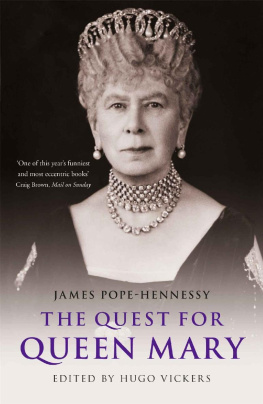Kenneth Hotham Vickers
Humphrey, Duke of Gloucester: A Biography
Published by Good Press, 2019
EAN 4064066204662
PREFACE
Table of Contents
The following pages have been written amidst many interruptions and completed amidst great difficulties. The excuse for their existence is to be found in the total absence of any adequate biography of their subject, and the attraction (to the author at any rate) of a varied and interesting career. My indebtedness to those who have made a study of the fifteenth century is acknowledged in the bibliography, but my obligations extend much further. My thanks are due to many librarians who have given me every facility to inspect manuscripts in their care, but to Mr. Falconer Madan of the Bodleian Library at Oxford I am under no ordinary debt of obligation. His consistent kindness and interest has made many paths smooth that would otherwise have been rough. I am indebted to Lord Leicester for his kindness in allowing me to examine a manuscript life of the Duke which forms part of his Library, and to Mr. Yates Thompson for a similar permission with regard to the Dukes Psalter. Still more do I desire to thank Dean Kitchin for his courtesy and kindness in sending me a transcript of a letter in a Durham manuscript, whilst Professor Oman has given me the great encouragement of his sympathy and advice. To Dr. Morris of Bedford I owe assistance on some points of difficulty, and Sir Alfred Scott-Gatty, Garter, was kind enough to answer several questions with regard to the Dukes armorial bearings. To my mother, who has spent many weary hours in copying my manuscript; to my sister, who is largely responsible for the index; and to my friend, Mr. H. W. Ward of Frenchay, whose assistance, both clerical and critical, has been freely given, the mere record of my gratitude is not sufficient.
Mr. E. Alfred Jones has kindly allowed me to reproduce the photograph of a cup which once belonged to Duke Humphrey, and which forms part of the collection he has made for his book on The Old Plate of the Cambridge Colleges, whilst the possessor of the manuscript copy of Beccarias dedication to Duke Humphrey, prefaced to his translation of Boccaccio, was good enough, through the kind instrumentality of Mr. Strickland Gibson of the Bodleian Library, to allow me to photograph this unique document.
K. H. V.
Frenchay , August 1907.
ILLUSTRATIONS
Table of Contents
Portrait of the Duke of Gloucester. From Bibliothque de la Ville dArras MS., 266,
[See .] |
| PAGE |
Cup bearing the Arms of the Duke of Gloucester and his wife Eleanor in enamel, now in the possession of Christs College, Cambridge.
From a photograph kindly lent by Mr. E. Alfred Jones, |
The Duke of Gloucester and his wife Eleanor being received into the Fraternity of St. Albans. Cotton MS., Nero, D. vii.,
[See .] |
| The Siege of Calais (1436). From the History of the Life and Acts of Richard Beauchamp, Earl of Warwick. Illustrated by Drawings by John Ross of Warwick. Cotton MS., Julius, E. iv., Art. 6, |
A page from the Duke of Gloucesters Psalter. Royal MS., 2, B. i.,
[See ] |
The Duke of Gloucesters Autograph and a Label from one of his Books. Harleian MS., 1705, and Harleian MS., 33,
[See .] |
Capgrave presenting his Commentary on Genesis to Gloucester. Oriel College MS., xxxii.,
[See .] |
| Drawing of the Old Divinity Schools, Oxford, dating from 1566. MS. Bodley, 13, |
A page from the Duke of Gloucesters copy of Le Songe du Vergier, once part of the Library of Charles V. of France. Royal MS., 19, C. iv.,
[See .] |
Several photographs for the above Illustrations have been kindly lent by
Mrs. Maude C. Knight, Richmond, Surrey.
ERRATA
P. 27, l. 10, for Abbville read Abbeville.
P. 45, note 191, for Stowe read Stow.
, for Ponte read Pont.
P. 92, l. 23, for Dowager-Duchess read Dowager-Countess.
P. 314, l. 13, for Northampton read Northumberland.
P. 366, l. 2, for Festus Pompeius read Pomponius Festus.
, for Villari read Villani.
INTRODUCTION
Table of Contents
It was Polydore Vergil who first drew attention to the fatality of the Gloucester title. It was borne by luckless King John, Thomas of Woodstock earned a violent death, Thomas le Despenser was beheaded, while in days later than those treated of in this volume, King Richard III. found that the hand of fate was against him. Humphrey Plantagenet of the House of Lancaster was no exception to this rule. His life was violent, his death suspicious, and even after this his misfortunes did not desert him; for though the tradition of the Good Duke lingers in some quarters even to the present day, his importance is not recognised by the historian. His selfishness and his lack of statesmanship have made him a byword in fifteenth-century history, and his true title to fame has been forgotten amidst the struggles which prepared the way for the Wars of the Roses.
It is rather remarkable, wrote Bishop Creighton in 1895, that more attention has not been paid to the progress of Humanism in England, and especially to the literary fame of the Duke of Gloucester. It is certainly strange that this Duke should have found as his literary executors only two men, both Germans, and they even have not devoted more than a passing attention to his fame. Whilst there is no little interest to be found in the story of his public career, the main importance of his life is centred in his position as a literary patron. He was unique in the history of his country and age, in taking an interest in the classical authors of Greece and Rome, who had lain buried beneath the accumulated dust of the Middle Ages, and to him we can trace the renaissance of Greek studies in England, and the revival of Litter Humaniores in the University of Oxford. The fifteenth century, with all its foibles and all its baseness, has been disregarded by many who prefer an age of heroism or an age of material progress. Yet the picturesque is not lacking in Duke Humphreys career, and his influence is felt even at the present day. In his life we can trace the spirit of his age, though many of the characters which flit across the stage are indefinite, and bear few striking qualities.
This is particularly true of Gloucester himself. Few personal touches are to be found in the historical writers of the period, and his character is often elusive, his actions often uncertain. The present volume aims at tracing the salient events of his career in relation to the history of his times, and at showing his relationship to fifteenth-century literary aspirations, both in Italy and in England. A hero no biographer can make him in spite of his many virtues, but at least he should be relieved of the universal blame cast upon him. In his life he was typical of his age, in his death the outward failure of his career was clearly evident; but as the first English patron of those scholars who were to revolutionise the mental attitude of the world, he deserves recognition and remembrance, if not reverence.
HUMPHREY, DUKE OF GLOUCESTER
CHAPTER I
EARLY LIFE
Table of Contents
On the north-east border of the German-speaking races, there existed in the latter days of the fourteenth century one of those old religious military orders, which had been founded to carry on war against the infidel in the Holy Land. Here, where German met Slav, and Christian met Pagan, the Knights of St. Mary found a new sphere of usefulness, after the military orders had become discredited, and in their war against the heathen Lithuanians they attracted many of the adventurous spirits of Christendom. Thus King John of Bohemia, who fell at Crcy, had lost his eyesight fighting in these North German marches, and the adventurous Henry of Bolingbroke, son and heir of John of Gaunt, spent some of his energies in helping the Teutonic knights in their wars. It was on one of these expeditions that at Knigsberg news was brought to the future King Henry IV. of England that his wife had borne him a son who had been named Humphrey.[1] It was on November 1, 1390, that the sailor who carried this news received his reward as the bringer of good tidings, so the birth was probably in the preceding August or September.[2]










